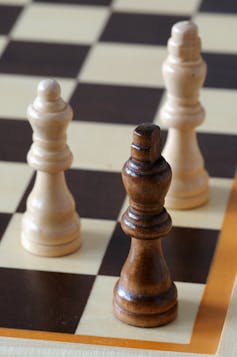3 things to consider before you let your child play chess online
Playing chess online offers a variety of ways for children to get good at the royal game, but it also comes with a few pitfalls. An expert in chess education provides some advice.

Editor’s note: The school closures forced by COVID-19 have parents and students searching for ways to make the best of their time indoors. Here, Alexey Root, a former U.S. Women’s Chess Champion who teaches online courses about chess in education, offers tips for parents and caregivers of children who are interested in playing chess online.
1. Put safety first
Doing things online comes with safety concerns. Chess is no different. Therefore, some common online safety advice applies to chess players of all ages: Use a fake username rather than your real name. Hide personal information, such as where you live, where you work or where you go to school. Keep interactions online rather than agreeing to meet in person.
Additionally, children who play or learn chess online should be supervised by parents. Parents should block their children from sharing personal messages and photos with online chess opponents. Some chess websites offer child-safety features, such as disabling all chats. Nonetheless, unsupervised children may figure out how to circumvent those features. There is no substitute for parental supervision.
2. Study the basics
For beginners, I would recommend studying three things: basic endgame checkmates, opening principles and tactics.
One example of a basic endgame checkmate is checkmating with a king and queen against a king. Learning that checkmate is important, because if one is a queen ahead, one should know how to win with that advantage. Search for “basic endgame checkmates” to find instruction and bots to practice against.

Opening principles should guide your first 10 moves. They include controlling the center of the board, “developing” your knights and bishops – that is, getting them into play – and castling. Castling is where a king moves two squares toward a rook, and that rook then hops over the king, landing near the middle of the board. That two-part maneuver makes the king more secure and the rook more active. Openings are probably the hardest thing for beginners to study online, since there are many initial moves that fit opening principles.
Beginners should also practice tactics, which are moves that result in immediate, tangible gains. Tactics are easy to find online. Most chess websites offer tactics problems that are tailored to your level. Get a tactics problem right, and the site gives you a harder one to solve. Get a problem wrong, and your next problem will be easier.
3. Stress fair play
In chess, success is often defined as winning a game, winning a tournament, or gaining points for your chess rating, which is how chess players measure their skill level compared to others. Players cheat in online tournaments even when there is no prize money at stake, usually to try to raise their ratings.
If a chess player cheats online, there are often consequences. Many chess-playing websites have robust cheating-detection mechanisms. Players’ accounts are routinely penalized rating points or even banned if cheating is detected.
To encourage fair play, call to mind the old expression: “It’s not whether you win or lose, it’s how you play the game.” For example, rather than defining success as whether a child won or lost, look at the time spent on each move of the game. Many online sites will measure that time. Praise children for taking an appropriate amount of time on each move. When you redefine chess success as thinking, instead of just winning, it’s an important step toward fair play.
[You’re smart and curious about the world. So are The Conversation’s authors and editors. You can read us daily by subscribing to our newsletter.]
Alexey W. Root does not work for, consult, own shares in or receive funding from any company or organization that would benefit from this article, and has disclosed no relevant affiliations beyond their academic appointment.
Read These Next
Trauma patients recover faster when medical teams know each other well, new study finds
A new study from a Pittsburgh hospital finds that trauma patients recover faster when emergency medical…
When unpaid cooking, cleaning and child care get a dollar value, income inequality in the US shrinks
Women’s unpaid work at home has declined much more than men’s contributions have increased.
I study why zebrafish larva prefer to circle left or right, to understand how and why human brains e
Being left- or right-handed – and the paw, eye, fin and wing equivalents – is a product of genes,…






